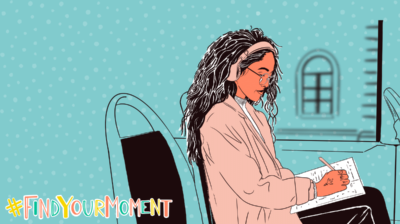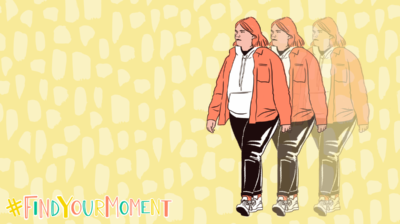Why it’s okay if mindfulness meditation doesn’t work for you
While meditation can help people to feel present, a study has found it might not be for everyone.

Mindfulness can reduce stress levels and anxiety, make us more aware of our unconscious minds including biases such as racism, boost self-compassion and positive body image, improve thought processes like attention span, and far more.
Mindfulness can be defined as the ability to be aware of what’s happening in the present moment, both inside of your body and in the world around you. One part of mindfulness training includes a meditation practice. Essentially, it combines the practice of meditation with mindfulness to help you focus on the present moment, the here and now.
Mindfulness is talked about so often that it can sometimes sound like the be-all and end-all of managing mental health. However, no one tool is the solution to everything. Having such a positive narrative around mindfulness can also make it feel like you’re the one doing something wrong if you don’t find the practice helpful.
Meditation doesn’t work for everyone
If mindfulness meditation isn’t something you find helpful, you don’t need to worry and you’re not alone. In fact, a study on meditation more broadly found that 25% of people who regularly meditate have had unpleasant experiences with it.
Some of these negative accounts include feelings of anxiety or fear and an altered sense of reality. There are lots of people who find meditation difficult or don’t experience the benefits associated with it.
Some people just don’t like doing it and that’s completely okay too. Currently, little is understood about why this is but with more research, society can build a deeper and more nuanced understanding of meditation to improve therapy sessions and mental health support.
Discussing the limitations of mindfulness doesn’t mean you have to paint everyone’s mindfulness experience with the same brush. It simply highlights that mindfulness isn’t the only route to improving wellbeing.
Find what works for you
So if mindfulness meditation isn’t your thing, it’s not your fault and there are plenty of other ways to mind your mind too. Personally, I prefer to be doing something to focus on and switch off without having to concentrate too hard. What I mean is, sometimes it can be difficult to sit in silence and detach myself from my thoughts so instead, they start swirling around my mind and I get stressed about each one that pops into my head.
But, if I’m baking, I can enjoy the process and focus on the task itself over anything else. I’m also doing something I love and I get a satisfying reward at the end. I also think that colouring in classes for wellbeing or drawing lines in Woodwork works for me. I think this is because I’m not consciously being mindful but the simplicity of the action means I can think about only that and still achieve a feeling of victory in some way when I finish it. My favourite tool is reading as I can get lost in the words and the story they hold.
Make your mental health toolkit unique to you
These are some of my tools along with other regular self-care practices like exercising in a way that helps me appreciate my body, spending time in nature, eating a balanced diet full of healthy foods and treats, spending time with family, friends and more. Nonetheless, the tools I use may not help you and actually, it’s unlikely that they all will because we are unique people and so our mental health toolkits should be too!
If you’re starting your mindfulness journey, you could experience all of the recorded benefits but it’s important to be aware that it’s okay if you don’t see the typical results. Either way, you can build up a toolkit that you can come back to and take your pick from. Instead of trying to make a generic tick-box practice work for you, learning more about your individual mental health is so much more valuable and it may include mindfulness meditation just yet.






